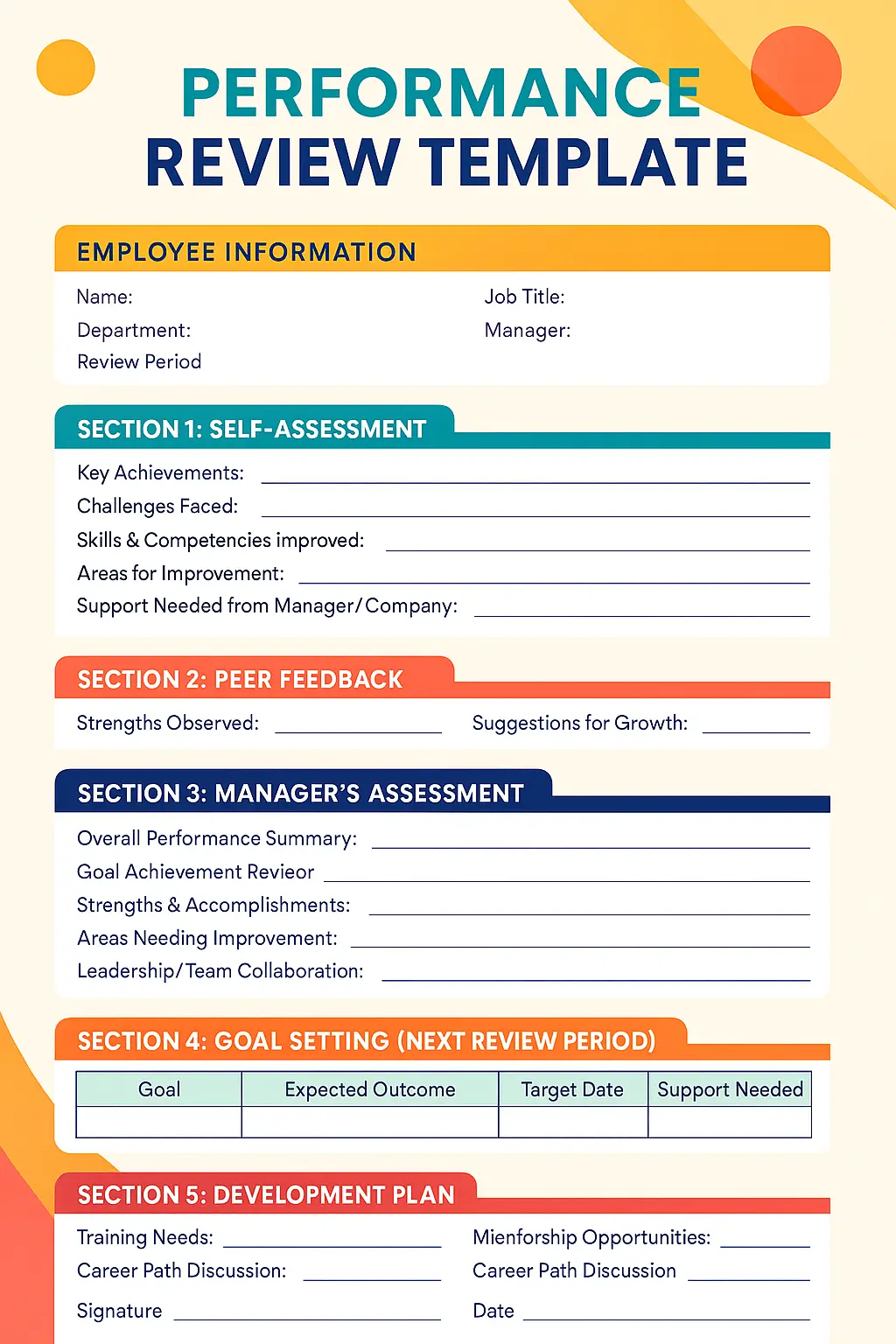180 Performance Review Phrases & Examples

If you are a manager or team leader, you’ve probably experienced that when the time comes to give performance reviews, it’s difficult to know what to write. These reviews are the backbone of the performance management process, but when it comes to using the right performance review phrases, it can be hard to get it right. Sometimes, the words chosen are either too harsh or vague compliments.
To save you time, we have put together a list of 180 phrases along with real-world performance review examples, which you can use according to your needs quickly and easily. With these phrases you can give reviews more effectively so employees can understand their strengths and areas for improvement.
You can also download our performance review template for free.
180 Performance Review Phrases You Can Use
We have compiled a list of 180 phrases and divided them into categories like communication, leadership, and time management, so you can use them to give specific, helpful, and meaningful feedback to your employees.
Communication and Interpersonal Skills
Positive phrases:
- Communicates clearly in meetings and written reports.
- Demonstrates strong active listening skills.
- Builds rapport with clients and colleagues effectively.
- Provides and receives feedback with professionalism.
- Clearly explains ideas and instructions to others.
- Adjusts communication style to suit different audiences.
Constructive phrases:
- Needs to listen more attentively during conversations.
- Sometimes struggles to express ideas clearly.
- Can improve on being more open to feedback.
- Tends to dominate conversations in group settings.
- Needs to engage more with peers during discussions.
- Could improve tone and clarity in written communication.
Time Management
- Positive phrases:
- Prioritizes tasks efficiently and meets deadlines.
- Maintains a structured and consistent workflow.
- Plans daily activities effectively to avoid delays.
- Balances multiple responsibilities without issue.
- Always prepared and on time for meetings.
- Uses calendars and tools to manage workload.
Constructive phrases:
- Needs to improve punctuality and meet deadlines.
- Often appears rushed or unprepared.
- Struggles to prioritize daily responsibilities.
- Needs to avoid procrastinating on key tasks.
- Frequently underestimates the time needed for tasks.
- Can benefit from better task scheduling.
Attendance
Positive phrases:
- Maintains excellent attendance and punctuality.
- Consistently arrives at work on time.
- Rarely absent and provides advance notice when necessary.
- Demonstrates reliability by being present and prepared.
- Follows company time-off policies diligently.
- Available and dependable during critical times.
Constructive phrases:
- Frequently arrives late to work or meetings.
- Needs to improve attendance consistency.
- Often absent without prior communication.
- Tends to miss important deadlines due to unavailability.
- Should adhere more closely to company attendance policy.
- Needs to improve accountability regarding presence.
Leadership
Positive phrases:
- Leads by example and earns the team’s respect.
- Encourages growth and development among team members.
- Takes responsibility for team performance.
- Communicates vision and motivates others effectively.
- Makes decisions confidently and fairly.
- Fosters a positive, inclusive leadership style.
Constructive phrases:
- Needs to delegate responsibilities more effectively.
- Struggles to provide clear direction to the team.
- Can be more approachable and open to input.
- Needs to build stronger leadership presence.
- Tends to avoid addressing team conflicts directly.
- Should work on empowering team members more often.
Performance
Positive phrases:
- Consistently exceeds performance expectations.
- Delivers high-quality work with attention to detail.
- Takes ownership of tasks and responsibilities.
- Continuously seeks to improve results.
- Achieves set targets and contributes to team success.
- Demonstrates a strong work ethic and professionalism.
Constructive phrases:
- Performance varies and lacks consistency.
- Needs to take more initiative in task completion.
- Often misses targets and deadlines.
- Should improve accuracy and attention to detail.
- Needs regular supervision to maintain productivity.
- Could improve focus on long-term objectives.
Collaboration
Positive phrases:
- Promotes a collaborative and inclusive environment.
- Shares ideas openly and listens to others.
- Works well across departments and functions.
- Encourages teamwork and knowledge sharing.
- Actively supports peers and team members.
- Demonstrates flexibility in group projects.
Constructive phrases:
- Needs to improve cross-team communication.
- Sometimes resists input from others.
- Can be more cooperative in group settings.
- Tends to work in isolation rather than with the team.
- Needs to be more open to collaborative problem-solving.
- Occasionally dismisses others’ contributions.
Teamwork
Positive phrases:
- Works well in team settings and supports team success.
- Builds strong working relationships with peers.
- Willingly assists teammates when needed.
- Fosters team spirit and positive morale.
- Demonstrates trust and respect within the group.
- Communicates effectively in collaborative efforts.
Constructive phrases:
- Needs to be more actively involved in team activities.
- Sometimes lacks alignment with group goals.
- Struggles with open communication in teams.
- Can be overly critical of team decisions.
- Needs to develop better trust with peers.
- Avoids team responsibilities at times.
Attitude and Dependability
Positive phrases:
- Maintains a positive and proactive attitude.
- Shows reliability and consistency in daily work.
- Is calm and constructive, even under pressure.
- Accepts responsibilities without hesitation.
- Takes feedback well and strives to improve.
- Demonstrates commitment to company values.
Constructive phrases:
- Can be overly reactive in challenging situations.
- Needs to show more consistency in reliability.
- Occasionally demonstrates a negative attitude.
- Can be resistant to constructive feedback.
- Needs to take more ownership of mistakes.
- Sometimes lacks follow-through on tasks.
Innovation and Motivation
Positive phrases:
- Constantly brings new ideas to the table.
- Actively looks for better ways to solve problems.
- Demonstrates enthusiasm for team initiatives.
- Motivates others with energy and optimism.
- Willingly experiments with new processes.
- Is self-driven and goal-oriented.
Constructive phrases:
- Struggles to think beyond conventional methods.
- Lacks initiative in exploring improvements.
- Can be hesitant to try new ideas or approaches.
- Needs to show more enthusiasm for team goals.
- Tends to rely on others for motivation.
- Should take more ownership in driving innovation.
Creativity
Positive phrases:
- Brings fresh, innovative perspectives to tasks.
- Is not afraid to challenge the status quo.
- Thinks outside the box to find solutions.
- Uses creativity to solve problems effectively.
- Inspires others through original thinking.
- Embraces new tools and techniques confidently.
Constructive phrases:
- Needs to apply more creativity to tasks.
- Often sticks to traditional approaches.
- Hesitant to try unconventional solutions.
- Lacks variety in ideas during brainstorming.
- Could push creative boundaries further.
- Needs to explore more creative solutions.
Adaptability
Positive phrases:
- Adapts quickly to new tools, roles, and challenges.
- Stays positive and focused during changes.
- Responds flexibly to shifting priorities.
- Learns new processes and systems effectively.
- Embraces change with a solution-oriented mindset.
- Supports others during transitions.
Constructive phrases:
- Struggles with unexpected changes in workload.
- Needs to be more flexible in work approach.
- Takes time to adjust to new processes.
- Often resists change initially.
- Can become overwhelmed by shifting priorities.
- Needs to build resilience in fast-paced environments.
Goal-Setting
Positive phrases:
- Sets realistic, measurable goals and achieves them.
- Aligns personal objectives with company vision.
- Regularly tracks and evaluates progress.
- Maintains focus on long-term targets.
- Sets ambitious yet achievable goals.
- Breaks down large goals into actionable steps.
Constructive phrases:
- Needs to set clearer, more structured goals.
- Often misses deadlines tied to goals.
- Lacks follow-through in goal completion.
- Tends to set vague or unrealistic targets.
- Could improve in tracking performance metrics.
- Should work on aligning goals with team objectives.
Performance Review Examples You Can Use
Now you have the phrases, but if you’re still struggling with how to use them correctly, then we have the following performance review examples for you. These real-world examples will help you better understand how to turn phrases into practical comments that you can actually use in reviews.
Communication
Positive Example:
“Chris is a great listener. He always lets others share their ideas and helps the team work well together.”
Constructive Example :
“Sara talks too much in meetings and doesn’t let others speak. She should give everyone a chance to share.”
Time Management
Positive Example:
“Ashley always finishes her tasks on time. She plans her work well and doesn’t need reminders.”
Constructive Example :
“Ben often takes longer than expected to finish work. He should plan better to stay on time.”
Leadership
Positive Example:
“Subhan helped the team during a big change. He kept everyone focused and clear about goals.”
Constructive Example :
“Maha does her own tasks well but needs to help her team more and share work.”
Initiative
Positive Example:
“Emily always looks for better ways to do things. She shares ideas that help the team.”
Constructive Example:
“Stephen does his work well but waits for instructions. He should try to take more action on his own.”
You can adapt these examples based on your company culture and the employee’s level. With these examples you can give a better review and can help your employee to grow.
If you’re looking for feedback you can give outside of formal performance reviews, we’ve also put together a list of practical employee feedback examples to guide everyday conversations.
How to Deliver Performance Review Phrases Effectively
Now that you have the list, you can use the employee performance appraisal phrases to maintain stability in your organization. They can be more actionable and help managers communicate more effectively by following these tips:
- Be specific: Managers should not praise or criticize generally, but they should give clear and specific feedback. That said, a general phrase like “You are doing great” seems more generic, while feedback like “You always meet deadlines and communicate clearly in team meetings” is more useful.
- Focus on behaviors: While giving a review, it is important that you are not communicating about a person but about a behavior. That means if someone shows laziness in work, you should give feedback like, “You often submit work past the deadline,” instead of saying, “You are lazy.”
- Direct is best: It is always difficult to give uncomfortable feedback, but it works well. So don’t skirt the issue; just give direct feedback, but always in a proper manner.
- Be timely: The best performance appraisals are those that happen regularly. This way employees improve more quickly.
- Co-create goals: The main part of these reviews is creating goals. Managers and employees collaboratively set future goals.
Why it’s important to get performance review phrases right
According to the studies, 63% of employees are less likely to leave their job when the reviews are given in a fair way. It means that a good review directly helps with employee retention. After feedback, the employee should know what their strength is and where there is a need for improvement, which is only possible when the review is clear and relevant.
Good reviews are only those that are fair and respectful and that specifically, not just generally, address areas for improvement. While constructive feedback is also important, if you mention next steps, then the employee should know what to do next.
Lastly, not only mention the areas of weakness but also appreciate the good work. For example, if an employee handles a project efficiently and completes it, then acknowledge their effort. It helps the employee understand which behaviors should be repeated.
Best Practices for Writing Effective Performance Reviews
When you write a performance review, it is important to avoid generic praise or criticisms. Mostly generic phrases like “Good work done” or “It can be improved” are not taken by employees seriously. You should mention the specific reason why the employee is praised, on which project he shows good work, or where there is a need for improvement. It not only helps employees to better understand, but they also feel that you are interested in their development.
You should set clear goals and also offer support because only mentioning the issues is not important. The main thing is to guide an employee so that overall performance will be better if the affected area is improved. Also, an employee should be instantly appreciated when he shows good work.
Finally, a review should always be a two-way conversation. Managers not only give the review but also take the feedback from the employee. Reviews should happen regularly, not only once a year, because regular check-ins make employees feel valued and connected while also helping managers to give support in a timely manner.
Conclusion
Performance reviews play an important role in performance management, but if the right words are chosen, they can help employees to better understand the areas of improvement, and they become more productive. You can use the above performance review phrases and examples to make the review process more effective.
If you are still relying on annual paperwork or multiple tools to run performance reviews, then using a platform like Zelt HR can be a time-saving and powerful solution for you. Zelt makes it easier to run fair, engaging, and efficient performance reviews, all in one place.
With customisable templates, automated reminders, and performance analytics, managers can focus on what matters most: giving meaningful feedback that helps people grow. Learn more about Zelt’s performance review software or talk to an expert.
Speak to us to learn how you can simplify performance reviews with Zelt


